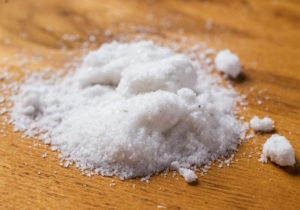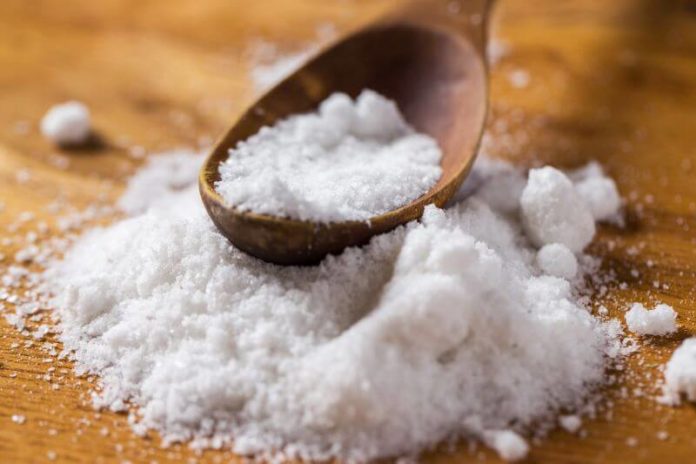Recent reports have highlighted a concerning situation: a salt shortage shortage, specifically involving kosher salt. This seemingly small issue has had a significant impact on grocery stores, restaurants, and consumers alike.
In this blog post, we will delve into the reasons behind the kosher salt shortage, the ramifications for grocery stores, and the social media response from frustrated customers.
History Kosher Salt
While salt itself has a long and fascinating history intertwined with civilization, kosher salt has a more specific origin story rooted in religious tradition. The name comes from the Jewish dietary laws known as Kashrut, which outlines acceptable foods and their preparation. One of these rules forbids consuming blood-containing meat. To address this, a process called koshering was developed to remove blood from meat.
This involved using a coarse-grained salt to draw out the blood through a salting and rinsing process. This coarse salt became known as “koshering salt.”Over time, the term “koshering salt” was shortened to simply “kosher salt” by merchants, and the name stuck. It’s important to note that kosher salt itself doesn’t necessarily need to be certified kosher – the name refers to the size and texture of the flakes, not its religious suitability. Today, kosher salt is prized by chefs for its versatility.
The large flakes are easy to control when sprinkling by hand, allowing for precise seasoning. They also dissolve slowly, creating a nuanced and even distribution of salt flavor. So, while its origins lie in a specific religious practice, kosher salt has become a popular kitchen staple valued for its functional qualities by cooks around the world.
Is There A Kosher Salt Shortage?
Yes, there is indeed a kosher salt shortage affecting various regions around the world. This particular type of salt, widely used in cooking and baking due to its coarse texture and pure flavor, has become increasingly difficult to find in grocery stores and online retailers.
The scarcity has left many home cooks and professional chefs scrambling to find a suitable replacement, with some resorting to using alternative types of salt or even attempting to create their own homemade kosher salt.

Why Is There A Kosher Salt Shortage?
The kosher salt shortage can be attributed to several factors. Firstly, the COVID-19 pandemic has led to disruptions in global supply chains, making it harder for manufacturers to source raw materials and distribute their products. This has resulted in production bottlenecks and a general slowdown in the availability of kosher salt.
Secondly, there has been a surge in demand for kosher salt as more people have turned to home cooking and baking during lockdowns and social distancing measures. This increase in demand has outpaced the supply, leading to a shortage in the market.
Lastly, natural disasters and extreme weather events, such as hurricanes and droughts, have also impacted salt production facilities, further contributing to the shortage.
Related Article:
Impact Of The Kosher Salt Shortage On Grocery Stores
Grocery stores have been hit hard by the kosher salt shortage. With limited stock available, store owners have had to place strict limits on the amount of kosher salt customers can purchase, leading to frustration and dissatisfaction among shoppers. In some cases, stores have been forced to increase the price of kosher salt, making it less affordable for consumers and potentially affecting sales of other related products.
Additionally, the shortage has compelled grocery stores to search for alternative suppliers, which can be a time-consuming and costly process. The lack of kosher salt on shelves also leads to a negative customer experience, as shoppers may have to visit multiple stores or turn to online retailers to find the product they need.
Social Media Response From Customers
The kosher salt shortage has not gone unnoticed on social media platforms. Customers have taken to Twitter, Facebook, and Instagram to express their frustration and share their struggles in finding kosher salt. Some have posted pictures of empty store shelves, while others have shared stories of having to resort to using different types of salt or even creating their own homemade versions.
This social media response has highlighted the extent of the issue and has also led to the sharing of tips and advice on where to find kosher salt or suitable alternatives. In some cases, it has even sparked discussions on the broader implications of supply chain disruptions and the need for more sustainable and local food systems.
What Are Alternatives For Kosher Salt?
1. Sea Salt
A natural alternative to kosher salt, sea salt is derived from evaporated seawater. It has a similar texture and flavor profile, making it a suitable substitute for many recipes.
2. Himalayan Pink Salt
This salt is collected from old ocean salt stores in the Himalayan Mountains. Its unique pink color and mineral content make it an attractive alternative to kosher salt.
3. Flake Salt
This type of salt has a delicate, flaky texture that can be easily crushed between your fingers. It’s perfect for finishing dishes and can be a good substitute for kosher salt in some recipes.
4. Table Salt
While table salt has a finer texture and may contain additives like iodine, it can still be used as a substitute for kosher salt in a pinch. However, be cautious with the quantity, as table salt is denser and can lead to over-salting.
The Secret Behind Kosher Salt Popularity
Kosher salt has gained immense popularity in recent years, and there are several reasons behind it. First, it has a coarser texture than table salt, which allows it to distribute evenly over food, providing a consistent flavor.
Second, it’s known for its purity, as it doesn’t contain additives like iodine, making it a preferred choice for many chefs and home cooks. Finally, kosher salt is often used in the process of koshering meats, which requires the use of a coarse salt to draw out blood from the meat.
The Importance of Kosher Salt in Our Daily Lives
Kosher salt plays a significant role in our daily lives, especially in the culinary world. As mentioned earlier, its coarse texture allows for even distribution and better flavor enhancement.
It’s also commonly used in baking, where it helps with the fermentation process and adds a subtle flavor to the dough. In addition, kosher salt is preferred for pickling and preserving food, due to its ability to draw out moisture and inhibit bacterial growth.
When Will the Kosher Salt Shortage End?
The kosher salt shortage is a result of various factors, including increased demand, supply chain disruptions, and production issues. While it’s difficult to predict an exact timeline for when the shortage will end, it’s essential to stay informed and adapt to the situation. In the meantime, consider using the alternatives mentioned above and adjust your recipes accordingly.
Conclusion
The kosher salt shortage is a real issue that has affected grocery stores, consumers, and the food industry as a whole. A combination of factors, including the COVID-19 pandemic, increased demand, and natural disasters, has contributed to this shortage.
As a result, grocery stores have had to adapt their stocking and pricing strategies, while customers have turned to social media to voice their concerns and find solutions. The situation serves as a reminder of the importance of resilient and sustainable food systems as we continue to navigate the challenges of the modern world.
FAQs – Kosher Salt Shortage
Is There Really a Kosher Salt Shortage?
Yes, There is, indeed, a shortage of Kosher Salt.
Isn’t Kosher SaltJust Table Salt? Can I Use That Instead?
Kosher salt and table salt have different textures. Kosher salt flakes are larger and dissolve slower, affecting how you use them in cooking.
If I Can’t Find Kosher Salt, What’s a Good Substitute?
Sea salt is a good option with a similar flaky texture. Just be aware it may have different mineral content and a slightly different flavor.
Isn’t Kosher Salt Used For Religious Purposes?
The name “kosher salt” refers to the large crystals, making it easier to remove blood from meat during kosher preparation. It’s popular for cooking due to its texture, not religious requirements.

